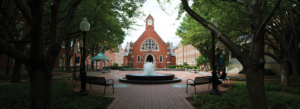
Empowering lay members and changing church culture are necessary for the Catholic Church to address sexual abuse, panelists agreed at a discussion held in the Dahlgren Chapel on Wednesday.
The panelists examined the best path forward for the Catholic Church in light of the sexual abuse allegations that have surfaced against several members of the church, including former cardinal Theodore McCarrick and Cardinal Donald Wuerl.
The panel included Anne Burke, a justice on the Supreme Court of Illinois and former interim chair of the National Review Board for the Protection of Children and Young People of the U.S. Conference of Catholic Bishops; Rev. Gerard J. McGlone, S.J., Ph.D., psychologist and associate director of Protection of Minors for the Conference of Major Superiors of Men; Erica Lizza (SFS ’19), president of Catholic Women at Georgetown; and Kerry Robinson (CAS ’88), founding executive director and global ambassador of the Leadership Roundtable. (Full disclosure: Lizza is a member of The Hoya’s editorial board.)
John Carr, director of the Georgetown University Initiative on Catholic Social Thought and Public Life, moderated the discussion.
The empowerment of laypeople could hold the church more accountable on issues such as cases of sexual assault and could force a shift in the church’s culture, Burke said.
“Until the laypeople are involved and know what the procedures are and what the rules are, I don’t know what we can do,” Burke said. “We have to make sure we draft those procedures.”
The problem of sexual abuse within the church remains ongoing, Burke said.
“This isn’t 50 years ago,” Burke said. “It’s still happening, so the culture is continuing.”
Civil authorities should step in to ensure the church undergoes a true cultural shift, Burke said. She also criticized the church for failing to incorporate the critiques of external review boards.
“I don’t see us getting into the culture unless we stand straight to them and force them,” Burke said, calling on the audience to place more pressure on their priests and bishops to implement reforms.
Wuerl resigned as archbishop of Washington, D.C., on Oct. 12 amid criticism over his handling of sexual abuse cases when he served as bishop in the Diocese of Pittzburgh. Wuerl remains the interim archbishop while the Archdiocese of Washington searches for a replacement, per the request of Pope Francis.
McCarrick resigned from the College of Cardinals in July following an allegation of sexual abuse. Since his resignation, four people have come forward with allegations of sexual abuse, which the Vatican is currently investigating. McCarrick served as Wuerl’s predecessor as archbishop of Washington, D.C, until 2006. Both McCarrick and Wuerl hold honorary degrees from Georgetown.
McCarrick has denied the allegation, and Wuerl has defended his actions while in the Diocese of Pittsburgh.
Bishops should “come clean” by proactively releasing documents and files that could indicate whether, and to what extent, they were complicit in the cover-up of sexual abuse, Burke said. Releasing such information would be an opportunity to show accountability, as dioceses across the country have received federal subpoenas, she said.
“It’s like substance abuse or alcoholism, where you hit rock bottom,” Burke said. “Until we know everything that’s going on, there’s no way for us to heal.”
McGlone, as a psychologist who has treated abusers, called for increased transparency in the church to begin changing the culture.
“Enough of the policy, enough of the criminal approach, enough of another report,” McGlone said. “We have to have significant cultural change and monitor that change.”
The Georgetown community should work with other Catholic universities to create a working group on addressing the issue, McGlone said.
The university should conduct an internal investigation on ways in which it is complicit in ignoring abuse, according to Lizza. Georgetown should also revoke the honorary degrees currently held by Wuerl and McCarrick, Lizza said.
“As to why this hasn’t been greenlighted or moving faster, I think it’s the same old culture of thinking that if we ignore it, it will go away,” Lizza said.
The university should also continue holding events that foster conversation about abuse in the Catholic Church and should host community outreach with students, Lizza said.
The Vatican needs to overhaul its system of promoting and selecting bishops in order to include women in Catholic leadership, according to Robinson.
“Why not have women serving on the congregation of bishops?” Robinson said. “We should be ashamed of ourselves as a church for underutilizing women. That is a terrible example of stewardship.”
The event showed the church’s reflection on its internal problems, rather than addressing issues like nuclear weapons, immigration, and racism, which Dahlgren dialogues have historically focused on, Carr said.




















